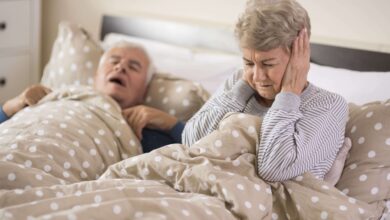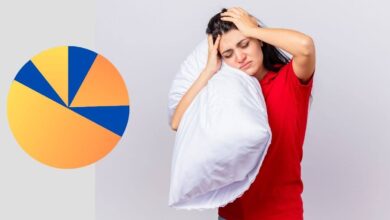Sleep Apnea: Causes, Symptoms, Treatment, and Tips for a Good Night’s Sleep

Sleep is an essential aspect of our lives, allowing our bodies and minds to recharge for the day ahead. However, for some individuals, a good night’s sleep is elusive due to a sleep disorder known as sleep apnea. In this article, we will explore the various aspects of sleep apnea, including its causes, symptoms, and available treatments. Additionally, we will provide tips to improve the quality of sleep for those affected by this condition.
What is Sleep Apnea?
Sleep apnea is a serious sleep disorder characterized by interruptions in breathing during sleep. These interruptions, known as apneas, can last for several seconds and may occur numerous times throughout the night. The two main types of sleep apnea are Obstructive Sleep Apnea (OSA) and Central Sleep Apnea (CSA).
Types of Sleep Apnea
Obstructive Sleep Apnea (OSA)
OSA is the most common form of sleep apnea and occurs when the muscles in the back of the throat fail to keep the airway open. This often happens when the soft tissue at the rear of the throat collapses and blocks the airway.
Central Sleep Apnea (CSA)
CSA is less common and involves the central nervous system. It occurs when the brain fails to send the appropriate signals to the muscles responsible for controlling breathing.
Complex Sleep Apnea Syndrome (Treatment-Emergent Central Sleep Apnea)
Complex Sleep Apnea Syndrome, also known as treatment-emergent central sleep apnea, is a combination of both OSA and CSA.
Causes of Sleep Apnea
Sleep apnea can be caused by various factors that contribute to the narrowing or blockage of the airway during sleep.
Some common causes include:
Obesity: Excess weight can lead to the accumulation of fat around the upper airway, increasing the risk of airway obstruction.
Age and Gender: Sleep apnea is more common in older adults and men.
Family History: A family history of sleep apnea may increase the likelihood of developing the condition.
Smoking and Alcohol Consumption: Both smoking and excessive alcohol consumption can contribute to airway inflammation and relaxation of throat muscles.
Medical Conditions: Certain medical conditions, such as congestive heart failure, high blood pressure, and type 2 diabetes, are associated with a higher risk of sleep apnea.
Signs and Symptoms
Sleep apnea can manifest through various signs and symptoms, affecting both the quality of sleep and daily functioning.
Some common signs and symptoms include:
Loud Snoring: Often noticed by bed partners, loud snoring is a hallmark of sleep apnea.
Gasping or Choking during Sleep: Individuals with sleep apnea may gasp for air or choke during sleep as breathing is momentarily interrupted.
Excessive Daytime Sleepiness: Frequent and persistent daytime sleepiness is common due to the disrupted sleep patterns.
Morning Headaches: Sleep apnea sufferers may wake up with headaches due to oxygen deprivation during the night.
Difficulty Concentrating: Sleep apnea can impair cognitive function and make it challenging to concentrate during the day.
Irritability and Mood Changes: Sleep deprivation can lead to irritability and mood swings.
Decreased Libido: Sleep apnea may contribute to a reduced sex drive.
Dry Mouth or Sore Throat upon Waking Up: Breathing through the mouth during sleep can cause dryness in the mouth and throat.
Diagnosing Sleep Apnea
If sleep apnea is suspected, a sleep study, known as polysomnography, is usually conducted. This study monitors various body functions during sleep, including brain activity, eye movement, muscle activity, heart rate, respiratory effort, air flow, and blood oxygen levels.
For a more convenient option, a home sleep apnea test (HSAT) may be prescribed by a healthcare professional.
The Impact of Sleep Apnea on Health
Sleep apnea can have significant consequences on one’s health if left untreated. Some potential health impacts include:
Cardiovascular Problems: Sleep apnea is associated with an increased risk of hypertension, heart attack, stroke, and irregular heartbeats.
Diabetes: People with sleep apnea have a higher risk of developing type 2 diabetes.
Mental Health Issues: Sleep apnea can contribute to depression, anxiety, and other mental health disorders.
Accidents and Impaired Cognitive Function: Daytime sleepiness can lead to accidents and reduced cognitive function, affecting daily activities and performance.
Treatment Options
Treatment for sleep apnea aims to improve the quality of sleep and reduce the frequency of breathing interruptions. The choice of treatment depends on the severity and type of sleep apnea.
Lifestyle Changes
For mild cases of sleep apnea, lifestyle modifications can be effective in alleviating symptoms. Some recommended changes include:
Weight Management: Losing excess weight can help reduce the narrowing of the airway and improve breathing during sleep.
Sleep Position: Sleeping on the side rather than on the back can prevent the tongue and soft palate from blocking the airway.
Avoiding Alcohol and Sedatives: Alcohol and certain medications can relax the throat muscles, leading to increased airway collapse.
Continuous Positive Airway Pressure (CPAP)
CPAP is a common and highly effective treatment for moderate to severe obstructive sleep apnea. It involves wearing a mask connected to a machine that delivers a continuous flow of air to keep the airway open during sleep.
Bi-Level Positive Airway Pressure (BiPAP)
BiPAP is similar to CPAP but delivers two different levels of air pressure—one for inhalation and a lower pressure for exhalation. This can be helpful for individuals who have difficulty exhaling against the constant pressure of a CPAP machine.
Adaptive Servo-Ventilation (ASV)
ASV is a newer treatment that uses advanced technology to monitor breathing patterns and adjust the airway pressure accordingly. It is often used for central sleep apnea and complex sleep apnea syndrome.
Oral Appliances
Custom-fitted oral appliances can help keep the airway open by repositioning the jaw during sleep. These devices are especially useful for individuals with mild to moderate sleep apnea who cannot tolerate CPAP therapy.
Surgery
In some cases, surgery may be recommended to remove excess tissue from the throat or reposition the jaw to improve airway passage. Surgical options are typically considered when other treatments have been ineffective or are not suitable for the individual.
Inspire Therapy
Inspire therapy is a surgical treatment for obstructive sleep apnea that involves implanting a device that stimulates the hypoglossal nerve, which controls tongue movement. This stimulation helps keep the airway open during sleep.
Tips for Better Sleep
While managing sleep apnea is essential, adopting healthy sleep habits can significantly improve the overall quality of sleep. Here are some tips for better sleep:
Establish a Consistent Sleep Schedule: Go to bed and wake up at the same time each day, even on weekends, to regulate your internal sleep-wake cycle.
Create a Comfortable Sleep Environment: Make your bedroom conducive to sleep by ensuring a comfortable mattress and pillows, controlling noise and light, and keeping the room cool and well-ventilated.
Limit Screen Time Before Bed: Avoid electronic devices and screens at least an hour before bedtime, as the blue light can interfere with your ability to fall asleep.
Relaxation Techniques: Practice relaxation techniques such as deep breathing, meditation, or gentle yoga before bedtime to calm your mind and body.
Regular Exercise: Engage in regular physical activity, but avoid intense exercise close to bedtime as it may hinder sleep.
Avoid Heavy Meals and Stimulants before Bedtime: Large meals and caffeine or nicotine consumption close to bedtime can disrupt sleep patterns.
Maintain a Healthy Weight: If you are overweight, losing even a modest amount of weight can improve sleep apnea symptoms.
Seek Professional Help if Needed: If you suspect you have sleep apnea or are experiencing sleep difficulties, seek advice from a healthcare professional for proper evaluation and treatment.
Sleep Apnea in Children
Sleep apnea can affect children as well. While some symptoms are similar to those in adults, there are specific signs to watch for in children, including:
Snoring: Frequent and loud snoring in children may indicate sleep apnea.
Restless Sleep: Children with sleep apnea may toss and turn or experience bedwetting during sleep.
Behavioral Problems: Sleep-deprived children may exhibit behavioral issues, hyperactivity, or difficulty paying attention.
Treatment for Pediatric Sleep Apnea
Treatment for pediatric sleep apnea may involve removing enlarged tonsils or adenoids, using CPAP therapy, or implementing lifestyle changes.
Sleep Apnea and Pregnancy
Pregnancy can exacerbate sleep apnea or lead to its development due to weight gain, hormonal changes, and increased fluid retention. It is essential for pregnant women with sleep apnea to manage the condition effectively.
Risks to the Mother and Baby
Untreated sleep apnea during pregnancy can increase the risk of complications such as gestational hypertension, preeclampsia, and gestational diabetes. It may also affect fetal growth and development.
Managing Sleep Apnea during Pregnancy
Pregnant women with sleep apnea should work closely with their healthcare providers to find safe and effective treatments. Lifestyle adjustments, such as sleeping on the side, may be recommended, and CPAP therapy can be used if needed.
Frequently Asked Questions (FAQs)
- Can Sleep Apnea Go Away on Its Own?
While mild cases of sleep apnea may improve with lifestyle changes, moderate to severe sleep apnea usually requires ongoing treatment.
- Is Sleep Apnea Hereditary?
There is evidence to suggest that genetics may play a role in the development of sleep apnea, but lifestyle factors also contribute to the condition.
- Can Sleep Apnea Affect Children?
Yes, sleep apnea can occur in children and may lead to behavioral and developmental issues if left untreated.
- Can I Drive with Sleep Apnea?
If your sleep apnea is well-managed and does not cause excessive daytime sleepiness, driving may be safe. However, if you experience drowsiness or fatigue while driving, refrain from operating a vehicle and seek medical advice.
- Is Surgery the Only Solution for Sleep Apnea?
Surgery is not the only option for sleep apnea treatment. Many cases can be effectively managed with lifestyle changes, CPAP therapy, or oral appliances.
Sleep apnea is a serious sleep disorder that can significantly impact one’s quality of life and overall health. It is essential to recognize the signs and symptoms of sleep apnea and seek professional help for diagnosis and treatment. With the right interventions, individuals with sleep apnea can experience improved sleep, increased daytime energy, and better overall well-being.




